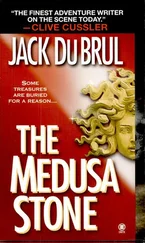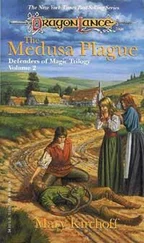Robert Masello - The Medusa Amulet
Здесь есть возможность читать онлайн «Robert Masello - The Medusa Amulet» весь текст электронной книги совершенно бесплатно (целиком полную версию без сокращений). В некоторых случаях можно слушать аудио, скачать через торрент в формате fb2 и присутствует краткое содержание. Жанр: Триллер, на английском языке. Описание произведения, (предисловие) а так же отзывы посетителей доступны на портале библиотеки ЛибКат.
- Название:The Medusa Amulet
- Автор:
- Жанр:
- Год:неизвестен
- ISBN:нет данных
- Рейтинг книги:5 / 5. Голосов: 1
-
Избранное:Добавить в избранное
- Отзывы:
-
Ваша оценка:
- 100
- 1
- 2
- 3
- 4
- 5
The Medusa Amulet: краткое содержание, описание и аннотация
Предлагаем к чтению аннотацию, описание, краткое содержание или предисловие (зависит от того, что написал сам автор книги «The Medusa Amulet»). Если вы не нашли необходимую информацию о книге — напишите в комментариях, мы постараемся отыскать её.
The Medusa Amulet — читать онлайн бесплатно полную книгу (весь текст) целиком
Ниже представлен текст книги, разбитый по страницам. Система сохранения места последней прочитанной страницы, позволяет с удобством читать онлайн бесплатно книгу «The Medusa Amulet», без необходимости каждый раз заново искать на чём Вы остановились. Поставьте закладку, и сможете в любой момент перейти на страницу, на которой закончили чтение.
Интервал:
Закладка:
Palliser put his briefcase down on a table before accepting the drink.
“You may leave that here,” Linz said, “I have so much to show you,” urging him on.
The tour was a lengthy one, ranging from the many salons to the top of the turrets. “As you no doubt know,” Linz said, “there was a royal edict, in the sixteenth century, decreeing that the nobility lower the walls and remove the pepperpot towers from their chateaux. The king wanted no fortresses in France that could withstand an assault by his troops, if it ever came to that.”
“But these, apparently, were spared,” Palliser observed. “Why?”
“Even then, no king dared to tamper with the Chateau Perdu. The place had acquired, shall we say, a reputation.”
“For what?”
“The dark arts,” Linz replied, with a hint of amusement. “It has served the chateau well ever since.”
From their perch on the ramparts, Palliser could gaze out over the tips of the ancient oaks and down to the river Loire at the foot of the cliffs. The sun was just setting, and the temperature had dropped another ten degrees. Even with the warmth of the Scotch in him, Palliser shivered in his Savile Row suit.
“But come, let’s go down to the dining room. We have a marvelous cook.”
Palliser was beginning to wonder when they were going to get down to business, but he knew that it was always best to betray no eagerness. Besides, he was astonished at the chateau and the thousand and one works of art it appeared to contain. Every corner held an oil painting in a gilded frame; every cornice was surmounted by a marble bust; every floor was covered with a threadbare, but immensely valuable, Persian carpet. Monsieur Linz, however peculiar he seemed, plainly possessed a great fortune and an exquisite eye. If anyone knew where La Medusa-the silver mirror lost for centuries-was hidden, Linz might be the man.
In the dining hall, a long refectory table had been set, and Palliser was guided to a seat in the middle. At one end, Linz sat down, while Rigaud sat directly across from their guest of honor. The other end was left empty, until Linz muttered something to a servant, and a minute or two later, a pretty blond woman, about thirty, fluttered in.
“I was exercising,” she said, and Linz snorted. She was introduced as Ava, but showed no interest in knowing who Palliser was or what he was doing there. Indeed, all through dinner she appeared to be listening to something through the earphones attached to an iPod in the pocket of her blouse.
The courses, many of them, were served silently by an older couple, and several bottles of very old, and very good, wine were poured. Palliser tried to gauge his intake, but the glass was always replenished as soon as he had taken a sip. Eventually, the conversation found its way to the assignment Palliser had undertaken.
“So tell me-what is so priceless about this mirror?” Linz asked, dicing up a roasted potato. Palliser had noticed that even though fish and game had been served, Linz had eaten only soup and vegetables. “Who would want it so badly?”
“That I am not at liberty to divulge,” Palliser said, glad for the convenient evasion. His only contact was with a Chicago lawyer named Hudgins, who closely guarded his master’s, or mistress’s, identity. “But may I ask you a question?”
Linz nodded vigorously, without looking up from his plate.
“How did you know what I was looking for?” He noted Rigaud throwing a glance at his boss.
Linz took a swallow from his wineglass, and said, “I’m an ardent collector, as you have already seen. I have many sources, many dealers, and they all keep me apprised of anything new that comes onto the market. They also tell me about any unusual inquiries. Yours was one of them.”
Palliser thought he’d been extremely discreet in his search so far, but now he wondered who had tipped off Linz. Was it that jeweler in Rome? The librarian in Florence? Some rival as yet unknown?
“Tell me what you know of it,” Linz said, “and maybe I will be able to help you.”
Palliser smelled a rat-a big one-but he suspected that Linz already knew what little he could tell him. Whoever his source was had undoubtedly told him a good deal more about what Palliser was seeking-a handheld looking glass, of sixteenth-century Florentine manufacture, and most probably from the hand of the master craftsman himself, Benvenuto Cellini. One side sported a silver head of the Medusa, her hair writhing like snakes, and the other concealed a mirror. Why his client wanted it more than anything on earth, he could not say.
But when he had finished, Linz speared the last of his asparagus, then said, “A lot of what Cellini made, as I hardly need to tell a man of your experience, has been lost or destroyed over the years. So how do you know it even exists? What proof do you have?”
“None, really, apart from a few papers in my case.”
Linz had the briefcase brought to them at the table, and as the servants poured out coffee, Palliser started to enter the combination to unlock the case, when he realized that it was already unlocked. Had he been so careless?
With some reservations, he produced copies of a sketch-in red and black ink-of the mirror, along with copies of some working papers written in Italian, and in a distinctive hand.
Linz studied them intensely, his dark hair, speckled with gray, sweeping low across his brow. There followed a detailed discussion of Cellini’s career, and of the Italian Renaissance in general, which bowled Palliser over. A graduate of Oxford, with a doctorate in art history, he knew a genuine connoisseur when he came across one-and Linz was not only a passionate devotee of the arts, but also someone who spoke of them with the intensity of an artist himself, someone who had wrestled with the aesthetic questions on his own terms. Palliser wouldn’t have been surprised if Linz had his own studio tucked away in one of the unexplored turrets.
Still, he felt that he had given the game away with little to show for it in return. When he finally ventured to ask his host what suggestions he might have for locating the Medusa, Linz leaned back in his chair, and after deliberating, said, “A lost cause, I should say. You admit that it hasn’t been seen for centuries. I should think it was best left alone.”
To Palliser’s practiced ear, it sounded like he knew more than he was telling. “I’m afraid I can’t do that.”
“Some things are meant to be found,” Linz said gnomically, “and others are meant to be lost. Everything has its own destiny. As an artisan,” he went on, astutely referring to Cellini in the vernacular of his day, “he was unparalleled in his various skills.” Although the term “artist” was also employed, and came into greater use over time, it was no insult, Palliser recognized, to be known as an artisan. “But in his own lifetime, even Cellini’s greatest work sometimes went unappreciated.”
“The Perseus statue was wildly acclaimed,” Palliser protested. He did not even mention the artist’s other great triumphs.
“But that was not his greatest work.”
Now Palliser was puzzled. Not his greatest work? It was one of the most revered works of all Renaissance art, known throughout the world.
As the evening progressed, Rigaud looked increasingly bored, and Ava perked up only when a torte was brought out, piled high with whipped cream and fresh strawberries. She dug in with gusto.
Linz, too, plainly enjoyed the dessert, a moustache of cream forming on his upper lip. But Palliser had lost his appetite. Glancing at his watch-it was well past ten-he said, “And I do hate to end the evening so abruptly, but I should get back to Paris. I still have La Medusa to find.”
“You sound undeterred,” Linz said. “I’m impressed.” Wiping his lips with his napkin, he added, “But if you would prefer to spend the night here, Lord knows we have plenty of room.”
Читать дальшеИнтервал:
Закладка:
Похожие книги на «The Medusa Amulet»
Представляем Вашему вниманию похожие книги на «The Medusa Amulet» списком для выбора. Мы отобрали схожую по названию и смыслу литературу в надежде предоставить читателям больше вариантов отыскать новые, интересные, ещё непрочитанные произведения.
Обсуждение, отзывы о книге «The Medusa Amulet» и просто собственные мнения читателей. Оставьте ваши комментарии, напишите, что Вы думаете о произведении, его смысле или главных героях. Укажите что конкретно понравилось, а что нет, и почему Вы так считаете.












